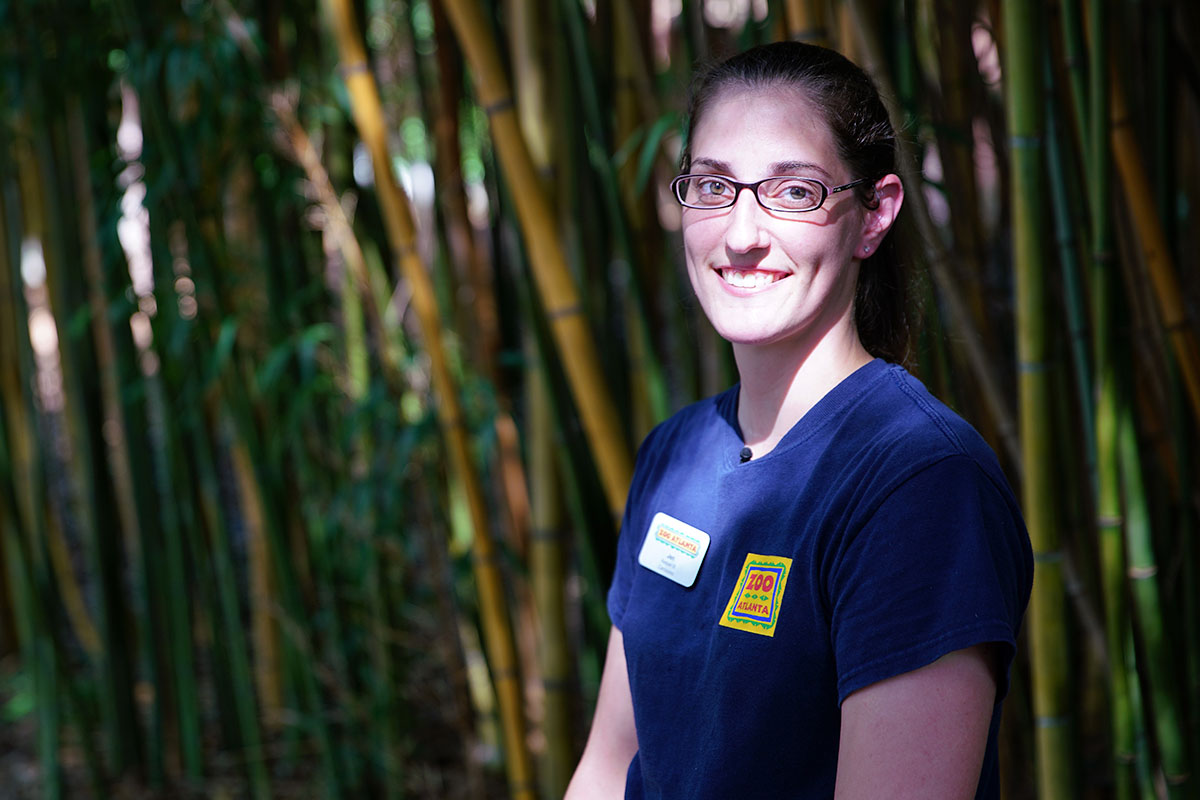
Share the Story on FacebookShare the Story on TwitterShare the Story via EmailShare the Story on LinkedIn
|
Jen Webb - Alumni Profile
Standing on one side of the glass wall, you can hear the sound of giggling and “aww” from children and adults alike as they watch, star-struck. On the other side are the objects of their fascination and Zoo Atlanta’s most popular attractions, giant pandas Lun Lun, Ya Lun, and Xi Lun.
The trio adorably wander around their habitat while their keeper, Clayton State University alumna Jen Webb ‘10, prepares their next bamboo meal.
Though she only had fish and frogs growing up, Webb always loved animals and knew she wanted to work with wildlife since she was a little girl. She came to Clayton State as a biology major, but was uncertain as to exactly what she wanted to do after graduation.
“Clayton State’s biology program is fantastic! I felt having an undergraduate degree in a broad field would give me more options,” Webb says.
It was not until after a research internship through her biology professor at Clayton State, Dr. Christopher Kodani, and her internship at Zoo Atlanta, that Webb realized she wanted to become a zookeeper.

"Giant pandas are such quirky, weird animals, and I love quirky and weird," says Webb with a laugh."
"You have to really love working with the animals. Most zookeepers are not there for the paycheck," she says. "You do it for the passion of the animals and protecting the environment."
Webb did not initially have a desire to work with giant pandas. Her favorite animal is the cheetah, and though Zoo Atlanta does not have any, she wanted to eventually transition to the big cats. Seven years on, she happily prefers being with the giant pandas.
“Giant pandas are such quirky, weird animals, and I love quirky and weird,” says Webb with a laugh.
Leave the glamor at the door Being a zookeeper is not an easy job. It involves a constant cycle of feeding and cleaning after the animals. Webb makes sure all the animals are healthy when she arrives each day and then feeds them for the first of five times. Giant pandas must be continuously fed because, while they are of the mammalian order Carnivora, they only eat bamboo.
“They have a polycyclic cycle, which means they are constantly eating, sleeping, eating, sleeping so they can get enough caloric intake to live,” says Webb.
After feeding the giant pandas in the morning, she then cleans the mess made overnight. She’ll have to clean again later in the morning. And clean again. And again. And again.
“You have to really love working with the animals. Most zookeepers are not there for the paycheck,” she says. “You do it for the passion of the animals and protecting the environment.”
Making a difference Giant pandas are considered an endangered species due to forest destruction and poaching. However, the wild giant panda population has increased to over 1,800, and programs like the one at Zoo Atlanta have played a major role. The zoo is one of only four in the United States with giant pandas, all of which are on loan from China.
“Everything we do helps protect the species as a whole. The hope is we will be able to build up a stable, captive population and then start reproducing that captive population to reintroduce them back into the wild,” says Webb.
Her favorite moment working at Zoo Atlanta came when Ya Lun and Xi Lun were born. Zookeepers were aware that their mother, Lun Lun, was pregnant after conducting an ultrasound. However, the twins were a surprise.
She was part of the overnight team taking care of the cubs initially, since baby giant pandas are blind, deaf, and unable to regulate their body temperature for the first month. It’s the reason, she says, why there are almost no cases of both pandas born as twins surviving in the wild—the mother has to choose to which cub she will give the necessary continual care.
Though giant pandas are wild animals and not their pets, zookeepers build an emotional bond with the animals. The twin panda cubs, Ya Lun and Xi Lun, will be returned to China to be released in the wild after they turn three years old, and that will be bittersweet.
“It’s sad to see them go,” Webb says. “But, at the same time, it’s kind of like watching your kids go off to college.”
Read more stories from this issue
